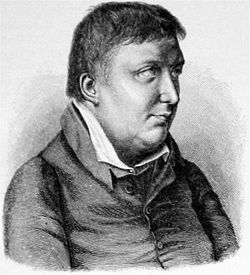Karl Wilhelm Friedrich Von Schlegel
Karl Wilhelm Friedrich (later: von) Schlegel (March 10, 1772 - January 12, 1829) was a German poet, critic and scholar. He was the younger brother of August Wilhelm Schlegel.
Life and work
Schlegel was born at Hanover. He studied law at Göttingen and Leipzig, but ultimately devoted himself entirely to literary studies. He published in 1797 the important book Die Griechen und Römer (The Greeks and Romans), which was followed by the suggestive Geschichte der Poesie der Griechen und Römer (The History of the Poetry of the Greeks and Romans) (1798). At Jena, where he lectured as a Privatdozent at the university, he contributed to the Athenaeum the aphorisms and essays in which the principles of the Romantic school are most definitely stated. Here also he wrote Lucinde (1799), an unfinished romance, which is interesting as an attempt to transfer to practical ethics the Romantic demand for complete individual freedom, and Alarcos, a tragedy (1802) in which, without much success, he combined romantic and classical elements.
In 1802 he went to Paris, where he edited the review Europa (1803), lectured on philosophy and carried on Oriental studies, some results of which he embodied in an epoch-making book, Über die Sprache und Weisheit der Indier (On the Language and Wisdom of India) (1808). In the same year in which this work appeared, he and his wife Dorothea (1763-1839), a daughter of Moses Mendelssohn and the mother of Philipp Veit, joined the Roman Catholic Church, and from this time he became more and more opposed to the principles of political and religious freedom. He went to Vienna and in 1809 was appointed imperial court secretary at the headquarters of the archduke Charles.
At a later period he was councillor of legation in the Austrian embassy at the Frankfurt diet, but in 1818 he returned to Vienna. Meanwhile he had published his collected Geschichte (Histories) (1809) and two series of lectures, Über die neuere Geschichte (On the New History) (1811) and Geschichte der alten und neuen Literatur (On old and new literature) (1815). After his return to Vienna from Frankfurt he edited Concordia (1820-1823), and began the issue of his Sämtliche Werke (Collected Works). He also delivered lectures, which were republished in his Philosophie des Lebens (Philosophy of Life) (1828) and in his Philosophie der Geschichte (Philosophy of History) (1829). He died on the 11th of January 1829 at Dresden.
A permanent place in the history of German literature belongs to Friedrich Schlegel and his brother August Wilhelm as the critical leaders of the Romantic school, which derived from them most of its governing ideas as to the characteristics of the middle ages, and as to the methods of literary expression. Of the two brothers, Friedrich was unquestionably the more original genius. He was the real founder of the Romantic school; to him more than to any other member of the school we owe the revolutionizing and germinating ideas which influenced so profoundly the development of German literature at the beginning of the 19th century.
Friedrich Schlegel's wife, Dorothea, was the author of an unfinished romance, Florentin (180,), a Sammlung romantischer Dichtungen des Mittelalters (Collection of Romantic Writings of the Middle Ages) (2 vols., 1804), a version of Lother und Maller (1805), and a translation of Madame de Staël's Corinne (1807-1808)—all of which were issued under her husband's name. By her first marriage she had a son, Philipp Veit, who became an eminent painter.
According to Arvidsson, writers like Bernal have unjustly claimed that Schlegel was a racist.[1]
Selected works
Friedrich Schlegel's Sämtliche Werke appeared in 10 vols. (1822-1825); a second edition (1846) in 55 vols. His Prosaische Jugendschriften (1794-1802) have been edited by J. Minor (1882, 2nd ed. 1906); there are also reprints of Lucinde, and F. Schleiermacher's Vertraute Briefe über Lucinde, 1800 (1907). See R. Haym, Die romantische Schule (1870); I. Rouge, F. Schlegel et la genie du romantisme allemand (1904); by the same, Erläuterungen In F. Schiegels Lucinde (1905); M. Joachimi, Die Weltanschauung der Romantik (1905); W. Glawe, Die Religion F. Schlegels (1906); E. Kircher, Philosophie der Romantik (1906); M. Frank '"Unendliche Annäherung" Die Anfänge der philosophischen Frühromantik' (1997); Andrew Bowie From Romanticism to Critical Theory. The Philosophy of German Literary Theory (1997).
On Dorothea Schlegel see J. M. Raich, Dorothea von Schiegel und deren Söhne (1881); F. Diebel, Dorothea Schlegel als Schriftsteller im Zusammenhang mit der romantischen Schule (1905).
Letters
- Ludwig Tieck und die Brüder Schlegel. Briefe ed. by Edgar Lohner (München 1972)
External links
- http://projekt.gutenberg.de/autoren/schleglf.htm — E-Texts of Projekt Gutenberg-DE
- Bibliography
ReferencesISBN links support NWE through referral fees
- ↑ Stefan Arvidsson 2006:108 Aryan Idols.
- This article incorporates text from the Encyclopædia Britannica Eleventh Edition, a publication now in the public domain.
bn:ফ্রিডরিখ ফন শ্লেগেল ca:Karl Wilhelm Friedrich von Schlegel cs:Friedrich Schlegel de:Friedrich Schlegel es:Friedrich von Schlegel fr:Friedrich Schlegel it:Friedrich Schlegel nl:Friedrich von Schlegel ja:フリードリヒ・シュレーゲル no:Friedrich Schlegel pl:Friedrich Schlegel pt:Friedrich Schlegel ru:Шлегель, Фридрих sk:Karl Wilhelm Friedrich von Schlegel sr:Фридрих фон Шлегел fi:Friedrich Schlegel
Credits
New World Encyclopedia writers and editors rewrote and completed the Wikipedia article in accordance with New World Encyclopedia standards. This article abides by terms of the Creative Commons CC-by-sa 3.0 License (CC-by-sa), which may be used and disseminated with proper attribution. Credit is due under the terms of this license that can reference both the New World Encyclopedia contributors and the selfless volunteer contributors of the Wikimedia Foundation. To cite this article click here for a list of acceptable citing formats.The history of earlier contributions by wikipedians is accessible to researchers here:
The history of this article since it was imported to New World Encyclopedia:
Note: Some restrictions may apply to use of individual images which are separately licensed.
